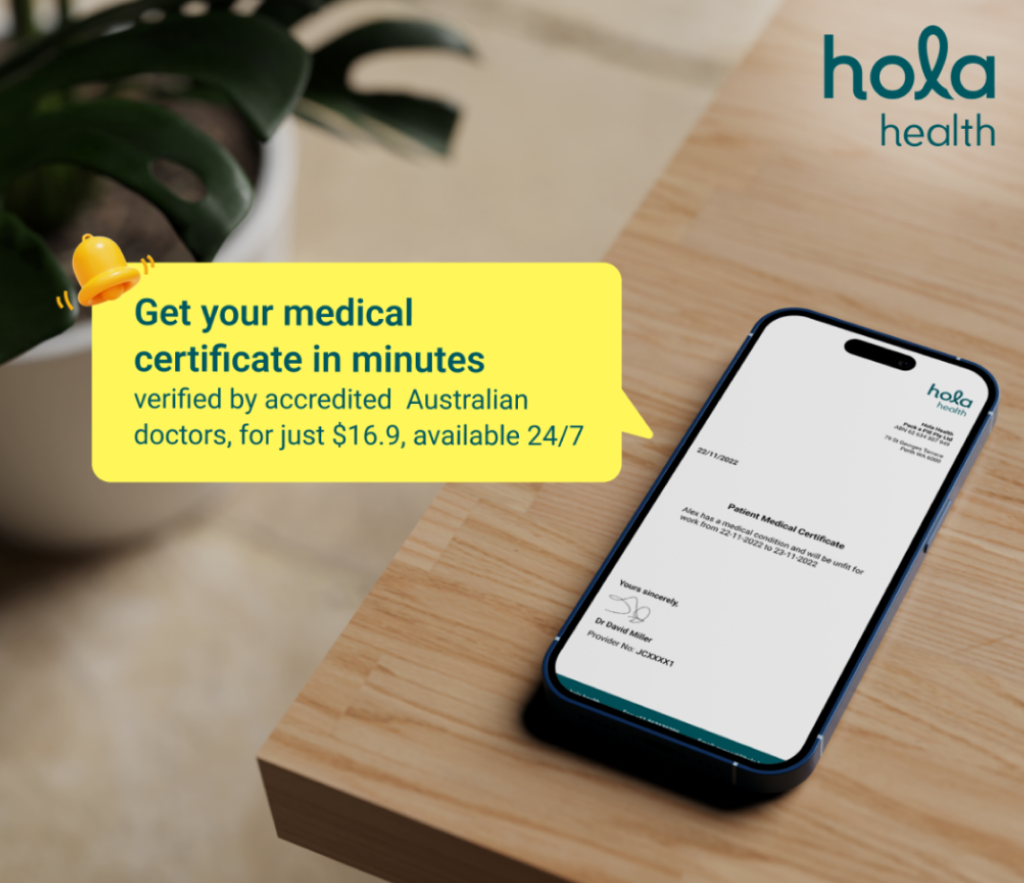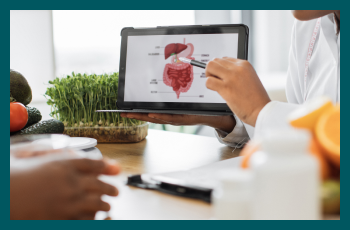- Home
- /
- Health Conditions
- /
- IBS
IBS Treatment
Get medical advice for inflammatory bowel syndrome from licensed online doctors within minutes from anywhere in Australia, 24/7.
About IBS

Medically reviewed by Dr. Ammar AL-ANI, MBChB, CCBST, AMC
When to consult a doctor for IBS?
You should consult a doctor for IBS if:
- Persistent symptoms: If symptoms like abdominal pain, bloating, or changes in bowel habits persist for several weeks or worsen over time.
- Unexplained weight loss: If you’re experiencing unintended weight loss along with IBS symptoms.
- Blood in stool: If you notice blood in your stool or your stool becomes black and tarry.
- Severe constipation or diarrhoea: If constipation or diarrhoea becomes so severe that it impacts daily life or leads to dehydration.
- Fever or vomiting: If you develop fever, worsening pain, nausea, or vomiting in addition to IBS symptoms, it could be a sign of infection.
- Change in symptoms: If the pattern or severity of your symptom’s changes.
- Family history: If you have a family history of colorectal cancer, inflammatory bowel disease (IBD), or other digestive disorders.
What are the symptoms of IBS?
The symptoms of irritable bowel syndrome (IBS) can vary widely among individuals, but common signs include:
- Abdominal pain: This is the most common symptom, often relieved by bowel movements.
- Bloating and gas: Many people with IBS experience a feeling of fullness or swelling in the abdomen, along with excessive gas.
- Diarrhoea: Frequent, urgent bowel movements with loose or watery stools.
- Constipation: Difficulty passing stools, infrequent bowel movements, or hard, dry stools.
- Alternating diarrhoea and constipation: Some people experience both diarrhoea and constipation.
- Mucus in stool: A small amount of mucus may be present in the stool, which is often noticed in IBS.
- Fatigue and sleep disturbances: Many individuals with IBS report feeling fatigued or having trouble sleeping due to discomfort or pain.
What are the causes of IBS?
The exact cause of irritable bowel syndrome (IBS) is unknown, but several factors are believed to contribute to its development:
- Gut motility issues: Abnormalities in how the muscles of the intestines contract and relax can lead to diarrhoea or constipation, common symptoms of IBS.
- Gut sensitivity: People with IBS often have heightened sensitivity in their digestive system.
- Stress: Emotional stress or anxiety can trigger or worsen IBS symptoms. The gut and brain are closely connected, and stress can influence gut function.
- Gut microbiome imbalance: An imbalance in the bacteria in the intestines may contribute to IBS symptoms, leading to bloating, gas, and discomfort.
- Dietary factors: Certain foods, like fatty foods, dairy, and high-FODMAP foods, can trigger IBS symptoms in some individuals.
- Family history: IBS can run in families, suggesting a genetic component.
What are some home remedies for IBS?
Here are some home remedies that may help manage IBS symptoms:
- Probiotics: Probiotics, especially those containing Lactobacillus and Bifidobacterium, can help balance gut bacteria and improve symptoms like bloating and diarrhoea.
- Dietary changes: A low-FODMAP diet, which limits fermentable carbohydrates that can cause digestive distress, has been shown to reduce IBS symptoms like bloating, diarrhoea, and constipation.
- Peppermint tea: Peppermint has natural antispasmodic properties that can help relax the muscles of the digestive tract and relieve pain.
- Ginger: Ginger can help reduce nausea, bloating, and discomfort. It can be consumed in tea or as a supplement.
- Soluble fibre: Adding soluble fibre, found in foods like oats, psyllium, and apples, can help regulate bowel movements and relieve constipation.
- Hydration: Drinking plenty of water helps keep the digestive system functioning smoothly and can alleviate constipation symptoms.
- Stress management: Since stress can trigger or worsen IBS, practising relaxation techniques like deep breathing, meditation, yoga, or mindfulness can help manage stress and reduce symptoms.
- Chamomile tea: Chamomile has soothing and anti-inflammatory properties that can help calm the digestive system and reduce IBS-related discomfort.
- Regular exercise: Physical activity can help regulate bowel movements, reduce stress, and improve overall gut health.
Is there a permanent cure for irritable bowel syndrome?
How can I speak to a telehealth doctor using Hola Health?
Can I get an instant script for IBS using Hola Health?
Yes, if you need an online prescription in Australia, you can visit Hola Health website or app and request an instant script hassle-free. Choose the consultation type, fill in your details along with your Medicare information. Make the payment via a secure payment gateway. Consult an online doctor over a video call, if approved, get an instant script within 15 minutes as an SMS.
How can I get an online doctor referral for IBS?
You can get an easy referral to specialists, pathology tests or radiology scans using Hola Health’s 24/7 GP referrals.
Are Hola’s doctors the same as the regular GPs?
Can I get a medical certificate online for work?
How can we help?
Trusted by 400,000 Aussies, Hola Health can help connect you with qualified health practitioners within minutes.
- Legit medical certificate online: Request legitimate medical certificates for work or school from the comfort of your home.
- Valid online scripts: Get access to instant scripts online within minutes anytime, anywhere
- Telehealth doctors available anytime: Speak to an online GP for IBS, other medical issues, mental health support, medication advice, and more.
- Instant online GP referrals: Access quick GP referrals to specialists, blood tests, pathology tests and radiology tests.
- Mental Health Care Plans available: If you’re eligible, get a valid Mental Health Care Plan from home with an online doctor consultation.
- Pharmacy delivery: Order prescriptions and have your medications delivered fast from an online chemist delivery in Australia.
Talk to a doctor today
Instantly connect to a registered practitioner within 15 minutes from anywhere in Australia, 24/7 for:
- General consults
- New & repeat scripts
- Referrals
- Medical certificates
- Mental health plans

Read more about IBS
Access telehealth services
Doctors Brisbane | Doctors Melbourne | Doctors Perth | Doctors Sydney | Doctors near me | Doctors Canberra | Doctors Adelaide | Doctors Darwin | Doctors Hobart
After hours Doctor Brisbane | After hours Doctor Melbourne | After hours Doctor Perth | After hours Doctor Sydney | After hours Doctor Hobart | After hours Doctor Gold Coast | After hours Doctor Canberra | After hours Doctor Adelaide | After hours Doctor Darwin | After hours GP | After hours doctor
Medical certificate | Medical certificate online for work | Medical certificate for school | Medical certificate for Uni | Medical certificate for stress | Carer’s leave certificate | Medical certificate NSW | Medical certificate QLD | Medical certificate VIC | Medical certificate WA | Doctors certificate online | Multi-day Certificate | Sick certificate online | GP medical certificate | Doctors note | Telehealth medical certificate | 2-day medical certificate | Medical certificate for sick leave
Instant scripts | eScript | Online prescriptions | Online prescriptions Sydney | Online prescriptions Melbourne | Online prescriptions Perth | Online prescriptions Brisbane | Online Rx prescription
Online referrals | Blood test referral | X-Ray referral | Pathology referral | Radiology referral | Specialist referral | Gynaecologist referral | Audiology referral | Ophthalmologist referral | Paediatrician referral | Ent specialist referral | Endocrinologist referral | Dermatologist referral | Urologist referral | Gastroenterologist referral
Telehealth appointment | Online Doctor | Bulk Billing Doctors | Doctors on-demand | Instant consult | Covid antiviral | Dial a Doctor | Online GP | Doctor appointment | Bulk-billing doctors | Telehealth pricing | GP online chat | Australian doctor | Web doctor | Home doctor | 24-hour doctor















